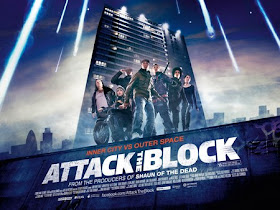(1982) Directed by Derek Burbidge; Starring: Various Artists; Available on DVD (Warner Archive Collection).
Rating: ****
Democracy has spoken! Based on my recent poll, blog readers have voted for me to explore underrated films as a new semi-regular feature. Okay, we’re only talking three votes to one for the other contenders, but hey, it’s still a majority (Thanks to everyone who voted, by the way!). Without further ado, I present for your consideration The Once Over Twice. * It’s an Island of Misfit Movies, if you will, shining the spotlight on a different underrated, overlooked gem. It’s a personal journey, not swayed by popular opinion or critical consensus. These are films that I like more than they probably deserve. Although I enjoy them for strictly selfish reasons, I hope that you’ll discover a new favorite in the months ahead.
The long-awaited omnibus concert film Urgh! A Music War DVD comes from the Warner Archive collection, a repository for oddball movies with limited appeal, or films that the studio didn’t have enough faith in to produce in mass quantities. As a result, these are made-to-order DVD-Rs, with minimal packaging. It’s a bare bones edition, to be sure, without chapter stops, director commentary, or any other extras, except for a trailer. Also, they’re quick to point out that the transfer has not been remastered, although the anamorphic video seems surprisingly good, all things considered. The audio, while not earth-shattering, seems acceptable for a concert film of this vintage. The performance by the group Splodgenessabounds has been omitted from this release for some reason, which might upset some purists, but the rest of the film appears to be intact. This might sound like a lot of griping over a relatively obscure concert film from the early 80s, but these are really just minor nitpicks. For years, I was almost resigned to the fact that I wouldn’t see this again in any form.
Memory can be a fickle thing. The problem with re-watching something that you haven’t seen in years is that your recollections can be better than the actual film. I was happy to discover, as a result, that this almost 30-year-old movie still holds up. The roster reads like a who’s who of contemporary artists from this vital era. It’s by no means exhaustive, but it does represent a sizable cross-section of the alternative (before anyone called it “alternative”) music scene from the late 70s/early 80s. It’s a great primer for those who’d like to get their feet wet, learning about bands from the era, as well as a trip down nostalgia lane for those who remember listening to many of these artists the first time around, like yours truly (Yeah, I feel old). Watching the artists strut their stuff in their prime is like seeing a perfectly preserved bug in amber – a window into another time. Almost 40 performances, representing nearly as many diverse musical sub-genres are represented here: avant-garde pop, punk, reggae, post-punk, psychobilly, new wave, and just about any other classification you could think of that would fall under the alternative music umbrella.
It’s beyond the scope of this post to catalogue and analyze every performance (you can find a complete listing here.), but I think it’s only fair to mention a few standouts. When performance artist Klaus Nomi hits the high notes, it’s a surreal moment that dares you not to look away. Gary Numan roves around onstage with his little motorized chair, looking like an alien detachedly commenting on life on earth. We also get to witness the Cramps and a totally unhinged Lux Interior that has to be seen to be believed (yet cannot be unseen). Other notable performances include: XTC (not long before they stopped touring altogether), Oingo Boingo, Dead Kennedys, Steel Pulse, Devo, Pere Ubu (The lead singer David Thomas looks like a dead ringer for Otho from Beetlejuice, and I can’t help but wonder if his appearance somehow influenced Glenn Shadix’s role in the Tim Burton Film.), Wall of Voodoo, Joan Jett and the Blackhearts, and many others.
Urgh! A Music War is not a perfect concert film. It randomly jumps around from venue to venue and genre to genre with little rhyme or reason. The viewer is immersed head first, without the benefit of any narrative cohesion to tie it all together. Not all of the individual performances are gems, but the hit-to-miss ratio is quite strong. It’s also a little too obvious that The Police were the top draw of that era, so they appear three times (Well, technically speaking, the third performance is actually a shared affair, with other bands participating), versus once for everyone else. Of course, it also helps when Miles Copeland, bother of Police band member Stewart Copeland, participated in the film’s production and was the president of A&M Records, which released the soundtrack. Don’t get me wrong. I like The Police, but this seemed a bit excessive.
Obviously, some of the fashions have dated better than others, but many of the songs still sound contemporary. It’s an interesting exercise to play “spot the influences,” and reflect on how many current artists have emulated the singers and musicians represented in Urgh! A Music War. Love or hate ‘em, there’s a raw energy permeating the production that just seems forced in similar acts nowadays. Alright, I’m starting to sound a bit like an old curmudgeon with my “things were better back then” soapbox rant, so I’ll wrap this up by saying that Urgh! A Music War is 2 hours well spent – or revisited.
* In case you might be wondering, the title for this feature references an X song with the same name. X, coincidentally, makes an appearance with their song “Beyond and Back.”




































